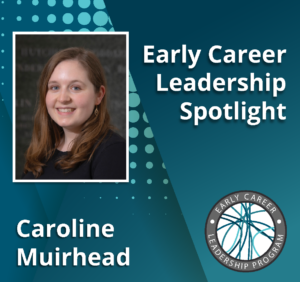We’re taking time to get to know the members of the GSA’s Early Career Scientist Committees. Join us to learn more about our 2020 early career scientist advocates.

Katherine Maniates
Policy and Advocacy Subcommittee
Department of Biological Sciences, Marquette University
Waksman Institute of Microbiology, Rutgers University
Postdoc
Research Interest
For my dissertation research, I focused on understanding how the mir-44 family of microRNAs (miRNAs) function in developmental processes such as germline sex determination. miRNAs are approximately 22 nucleotide non-coding RNAs that play a role in post-transcriptional gene regulation. Animals without miRNAs are often sterile and fail to develop. While we understand the importance of miRNAs as a class of regulators, we still don’t understand the function of many individual miRNAs. Studying this role is challenging, as they are often redundant with one another. Rather than an all-or-none response, miRNAs are thought to fine-tune gene expression, allowing for robust cell fate specification and differentiation. Understanding the role of different miRNAs will help understand their role in sculpting important developmental processes.
My research focused on characterizing the role of microRNAS in germline sex determination, in the model organism Caenorhabditis elegans. In C. elegans hermaphrodites, cell fate decisions are made for germline sex determination during larval development when sperm is generated during a short window before the switch to oocyte production. By analyzing newly generated mir-44 family mutants, we found a family of miRNAs that modulate the germline sex determination pathway in C. elegans. Mutants with the loss of mir-44 and mir-45 produce fewer sperm, showing both a delay in the specification and formation of sperm as well as an early termination of sperm specification accompanied by a premature switch to oocyte production. This suggests the mir-44 family promotes sperm cell fate specification during larval development, while also identifying an additional post-transcriptional regulator of the germline sex determination pathway.
As a PhD-trained scientist, you have many career options. What career paths interest you the most?
I am interested in staying in academia as a professor. I attended a small liberal arts college for my undergraduate education, where I experienced the amazing impact professors can have for developing curiosity about science. In their courses, I learned how to think critically and analyze evidence. This was also where I found my passion for teaching through my experience working as a Lecture and Laboratory Assistant. Working with students as they learned about biology was such a highlight. I was able to see where scientific concepts clicked and students were able to make the critical connections. This persisted into graduate school when I worked as a TA and mentored students in the lab. In the future, I’d like to continue doing both research and working with students. Beyond that, I’d like to make a lasting contribution to scientific knowledge with the work that I do in basic research. Ideally, I’d love to have the opportunity to both do research as well as continue to teach undergraduates.
In addition to your research, how else do you want to advance the scientific enterprise?
My overarching goal is to increase the public’s trust and understanding of data and scientists. We’ve all seen how trust in science has been decreasing. The events of 2020 have really illuminated the importance of effectively sharing scientific research with both legislators and the public, as well as what happens when people are not confident in the information being shared. A current example is vaccine hesitancy, wherein some people don’t have a clear understanding about what mRNA is or how it works. I would also like to share the importance of funding basic scientific research. I think this requires communicating information in an accessible way, as well as connecting scientists with people outside of their fields. I hope these acts can help to build trust in science. I hope that in some small way this can continue to move the scientific enterprise forward.
As a leader within the Genetics Society of America, what do you hope to accomplish?
Within the Policy and Advocacy Subcommittee, I’d like to help scientists get connected with ways to be involved in the fields of policy and advocacy, whether as a bench scientist or a full-time policy position. Furthermore, I’d like to start developing programs to connect GSA members with the people who are making policies that impact everything from grant funding to health policies. I’m excited to take advantage of these opportunities myself! I’d also like to continue to encourage diversity in the GSA and continue to connect with other GSA members.
Previous Leadership Experience
Early Career Leadership Program – Policy and Advocacy Subcommittee GSA
Graduate Student Mentor – NSF REU, Marquette University
Graduate Student Representative – Graduate Affairs Committee, Marquette University Department of Biological Sciences
Arthur J. Schmitt Leadership Fellow














